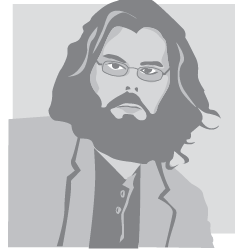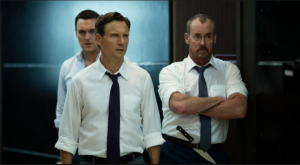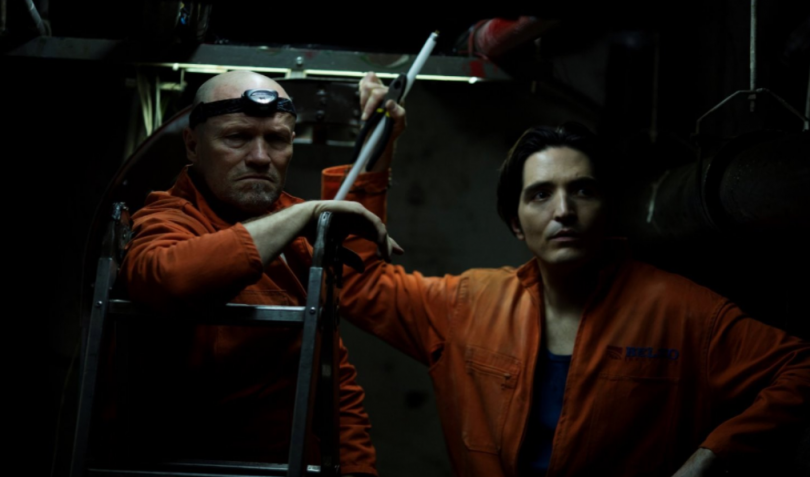aNewDomain  — Locked in an office building in Bogota, ordinary people are threatened with death unless they commit murder.
— Locked in an office building in Bogota, ordinary people are threatened with death unless they commit murder.
The first trial: Kill two people, or we will kill four.
Here’s a variation of the classic trolley problem.
Would you change the course of a train about to hit four people if it will instead hit two people? Initially, the victims believe they are being pranked. Nobody seriously considers committing murder on the orders of a voice over a loudspeaker, despite some weird events that morning.
But it isn’t a prank.
Explosives, previously implanted under the ruse of being tracking devices due to a high rate of kidnappings in Columbia, detonate inside four heads. Four bodies collapse gorily to the ground.
I saw The Belko Experiment in a less-than-crowded house on a Saturday night. I like a good horror movie.
This was graphic violence, vivid and violent, of a sort I could not have watched prior to being desensitized by the last couple of seasons of The Walking Dead.
Folks in my row, though, laughed.
That’s the first commentary Belko offers. Here it is:
We’re a sick society.
We laugh at the grimmest of jokes, even when those jokes are the deaths of innocents.
The next demand comes shortly on the heels of the first murders: Kill 30 people or we will kill 60.
 This is a kidnapping, and the hostage here is your moral values.
This is a kidnapping, and the hostage here is your moral values.
So what will you do?
Overcome your compunctions or hold to them?
The hostage-taker has proven he is serious already: He has killed four hostages.
Will you risk the remaining 74 hostages?
Or will you play along?
The situation quickly devolves into factions. Some people want to wait it out; others decide to reluctantly go along. Everybody can be said to have made an immoral decision. Are my moral values more important than your life?
Here is the second commentary: we all put our values ahead of the lives of others. Whether it is sending refugees back to probable torture and death in their nations of origin or voting against healthcare for all or voting against a livable wage, we have many examples in which a citizen puts some moral principle ahead of the survival of another human.
Such principles are often inconsistent – being, for example, pro-choice but anti-death penalty or vice-versa. That does not stop us from executing people in the name of principle.
Mike, the best contender for hero of this heroless story, makes the argument that everyone is going to die anyway.
There is no way the kidnappers can let anyone go after what they have witnessed. The demands must go on, must continue to become more depraved, until no one is left.
That he is correct does not make him moral.
He refuses to even try to save anyone by killing; he refuses to sacrifice his principles to the needs of potential survival.
At this point in the story, he’s only guessing.
In the end, I sympathize with this guy and with his position.
We all die. Without our moral principles, we surrender what we are. Our bodies might go on, but we have given up the wheel. Is it worth is to merely survive another hour, another few hours, another twenty years if we have become a person we can’t live with?
As I seem to say at least once a day lately, you haven’t really got a choice between living and dying. You have at best a choice between dying for something or dying for nothing.
As Falstaff says, “Honour pricks me on. Yea, but how if honor prick me off when I come on? How then? Can honor set to a leg? no. Or an arm? no. Or take away the grief of a wound? No. Honor hath no skill in surgery, then? No. What is honor? A word. What is in that word “honor”? What is that “honor”?
Air. A trim reckoning. Who hath it? He that died o’ Wednesday. Doth he feel it? No. Doth he hear it? No. ‘Tis insensible, then? Yea, to the dead. But will it not live with the living? No. Why? Detraction will not suffer it. Therefore, I’ll none of it. Honor is a mere scutcheon. And so ends my catechism.” (http://nfs.sparknotes.com/henry4pt1/page_223.html)
We honor the dead but the dead have no need of honor and neither have the living. Live or die in that office building in Bogota, nobody will remember.
 This is the third observation offered by this film. In the end, the antogonist (Barry) and the protagonist (Mike) duke it out. I won’t say which kills the other. Barry, though, says, “You didn’t change anything.” Mike’s resistance to the demands of the kidnappers had no effect on the outcomes. He was like Mad Max in Fury Road: a distraction from the main plot.
This is the third observation offered by this film. In the end, the antogonist (Barry) and the protagonist (Mike) duke it out. I won’t say which kills the other. Barry, though, says, “You didn’t change anything.” Mike’s resistance to the demands of the kidnappers had no effect on the outcomes. He was like Mad Max in Fury Road: a distraction from the main plot.
Mike has the answer ready, though:
“Neither did you.”
In a hundred years, we’ll all be dead.
Nobody will be alive in a thousand to remember our deeds.
And here is Conan at the end of Conan the Barbarian:
“No one… will remember if we were good men or bad. Why we fought or why we died. No. All that matters is that two stood against many.”
This film is a nihilistic epic, an invitation to wonder about the meaning of life in a life fated to end ignobly. Death is always banal. There’s no escape from it, no matter what you do. One woman hides most of the movie, taking daring risks to escape an elevator shaft only to be shot at the end. Maybe you can hide for a while, but you are going out like the rest of us.
Honor doesn’t matter. It isn’t real.
You can’t save anyone.
Your principles, like mine, aren’t worth dying for.
They aren’t.
The only hope we have is that our principles are worth living for, for as long as we have, anyway.
For aNewDomain, I’m Jason Dias.













